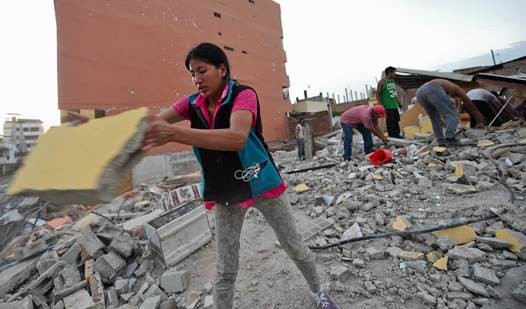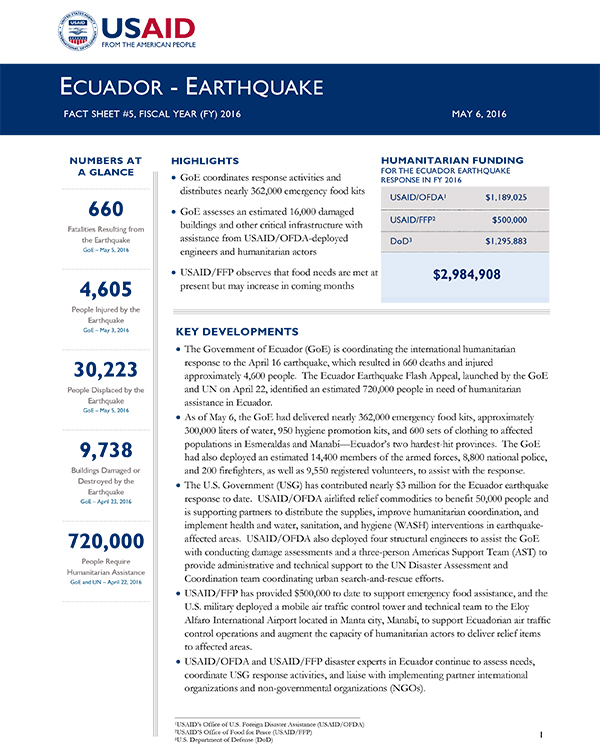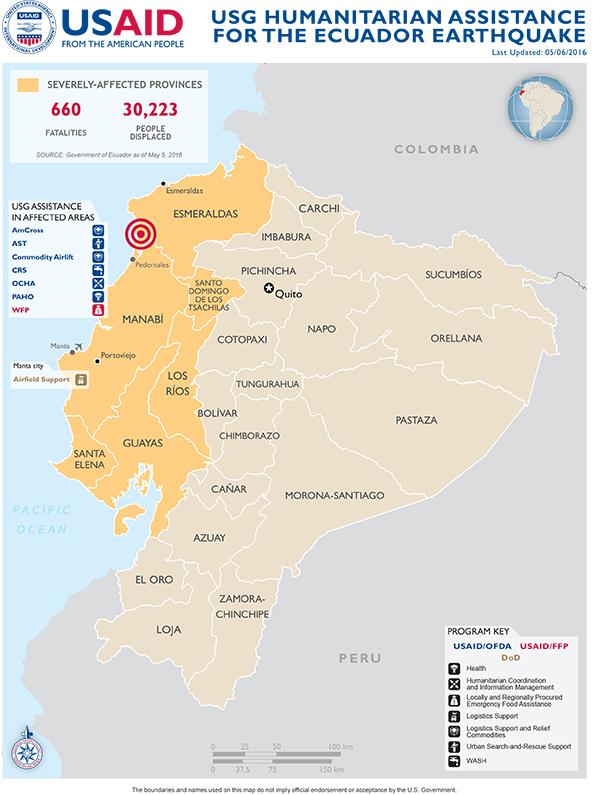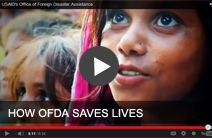- What We Do
- Agriculture and Food Security
- Democracy, Human Rights and Governance
- Economic Growth and Trade
- Education
- Ending Extreme Poverty
- Environment and Global Climate Change
- Gender Equality and Women's Empowerment
- Global Health
- Water and Sanitation
- Working in Crises and Conflict
- Disaster Assistance
- Political Transition Initiatives
- Conflict Mitigation and Prevention
- Countering Violent Extremism
- Disaster Risk Reduction
- Peacebuilding and Reconciliation
- Providing Safe & Secure Environments for Development
- Recovering From Crisis
- Resilience
- Tech Challenge for Atrocity Prevention
- World Humanitarian Day
- U.S. Global Development Lab

Latest Ecuador Fact Sheet
Ecuador Earthquake Fact Sheet #5 - 05-06-2016 ![]() (pdf - 199k)
(pdf - 199k)
Ecuador Map - 05-06-2016 ![]() (pdf - 405k)
(pdf - 405k)
view text version [pdf, 199kb]
Key Developments
The Government of Ecuador (GoE) is coordinating the international humanitarian response to the April 16 earthquake, which resulted in 660 deaths and injured approximately 4,600 people. The Ecuador Earthquake Flash Appeal, launched by the GoE and UN on April 22, identified an estimated 720,000 people in need of humanitarian assistance in Ecuador.
As of May 6, the GoE had delivered nearly 362,000 emergency food kits, approximately 300,000 liters of water, 950 hygiene promotion kits, and 600 sets of clothing to affected populations in Esmeraldas and Manabí—Ecuador’s two hardest-hit provinces. The GoE had also deployed an estimated 14,400 members of the armed forces, 8,800 national police, and 200 firefighters, as well as 9,550 registered volunteers, to assist with the response.
The U.S. Government (USG) has contributed nearly $3 million for the Ecuador earthquake response to date. USAID's Office of U.S. Foreign Disaster Assistance (USAID/OFDA) airlifted relief commodities to benefit 50,000 people and is supporting partners to distribute the supplies, improve humanitarian coordination, and implement health and water, sanitation, and hygiene interventions in earthquake-affected areas. USAID/OFDA also deployed four structural engineers to assist the GoE with conducting damage assessments and a three-person Americas Support Team to provide administrative and technical support to the UN Disaster Assessment and Coordination team coordinating urban search-and-rescue efforts.
USAID's Office of Food for Peace (USAID/FFP) has provided $500,000 to date to support emergency food assistance, and the U.S. military deployed a mobile air traffic control tower and technical team to the Eloy Alfaro International Airport located in Manta city, Manabí, to support Ecuadorian air traffic control operations and augment the capacity of humanitarian actors to deliver relief items to affected areas.
USAID/OFDA and USAID/FFP disaster experts in Ecuador continue to assess needs, coordinate USG response activities, and liaise with implementing partner international organizations and non-governmental organizations.
Background
Ecuador is vulnerable to a range of natural hazards, including earthquakes, forest fires, and volcanic eruptions. When disaster strikes, USAID/OFDA works with local and national government officials, civil society actors, and non-governmental organizations to address humanitarian needs and assist GoE relief efforts. USAID/OFDA also supports ongoing disaster risk reduction activities and capacity-building initiatives for disaster response throughout South America.










Comment
Make a general inquiry or suggest an improvement.